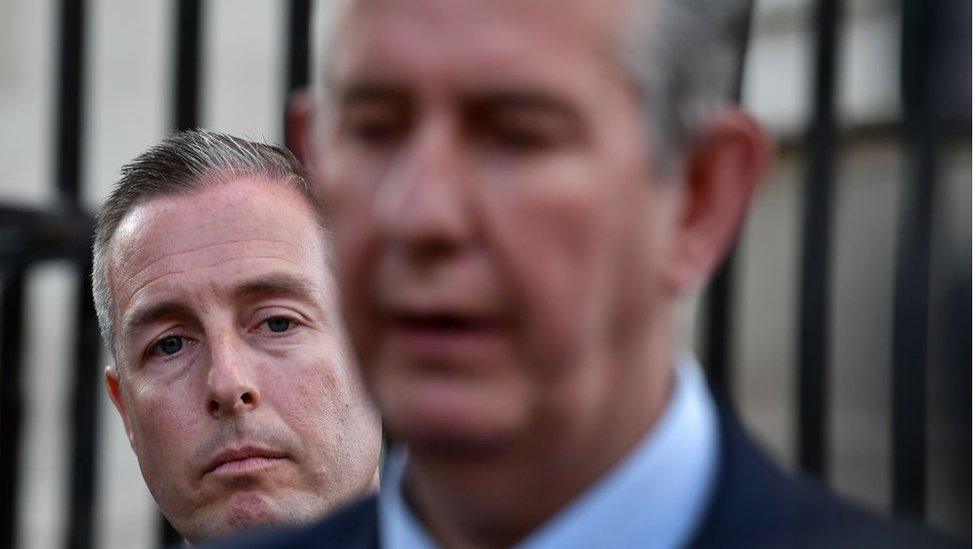Irish language talks back on at Stormont
- Published
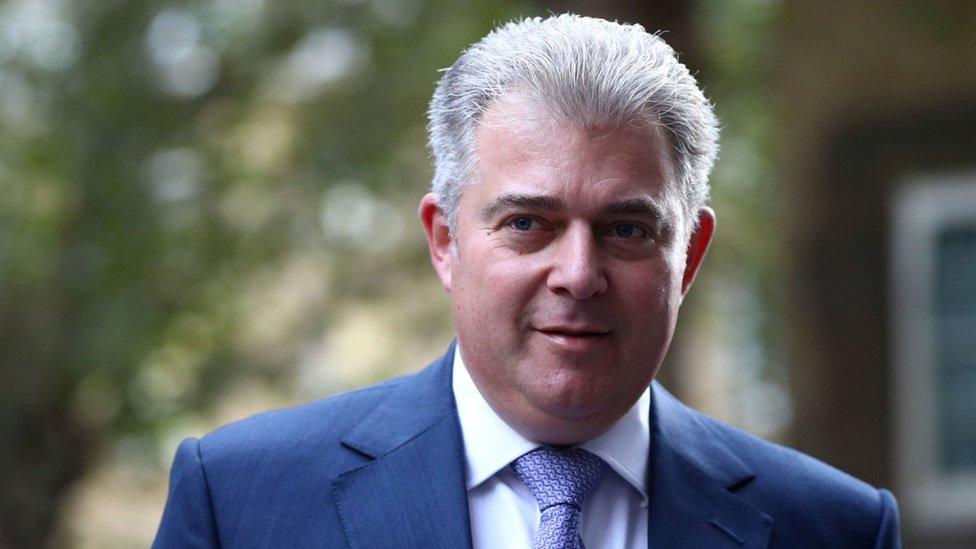
Brandon Lewis is holding a series of meetings with Northern Ireland's political parties
Talks at Stormont continue late into the night in a bid to break a stalemate over Irish language legislation.
Sinn Féin returned just before midnight on Wednesday to resume negotiations with NI Secretary Brandon Lewis.
He had earlier held meetings with Sinn Féin and the Democratic Unionist Party (DUP).
Sinn Féin has said it will not support a new DUP first minister unless the UK government intervenes and introduces language laws from Westminster.
Language legislation was part of the deal that restored power-sharing at Stormont last January.
The DUP has not agreed to pass the legislation before the next election.
After first meeting Mr Lewis, the Sinn Féin delegation said it needed clarity and more information before commenting further.
However, just before midnight, Sinn Féin President Mary Lou McDonald tweeted she was heading back to see the secretary of state, external.
The DUP left without speaking to the media.
'Only way forward'
Earlier on Wednesday, Prime Minister Boris Johnson said the "whole" deal that restored power-sharing at Stormont last January should be implemented.
Mr Johnson said people in Northern Ireland wanted a "stable, functioning and mature executive".
He was responding in the House of Commons to a question from former NI Secretary Julian Smith, who said it was "vital" parties stuck to the New Decade, New Approach (NDNA) commitments, external.
Mr Smith said the government should act as a "backstop" if the Stormont parties cannot make progress.
Arlene Foster resigned as first minister on Monday, six weeks after she was overthrown as the leader of the DUP.
Sinn Féin's Michelle O'Neill lost her position as deputy first minister at the same time because the roles form a joint office.
That led to a seven-day period for the approval of a new first minister and deputy first minister by Sinn Féin and the DUP.
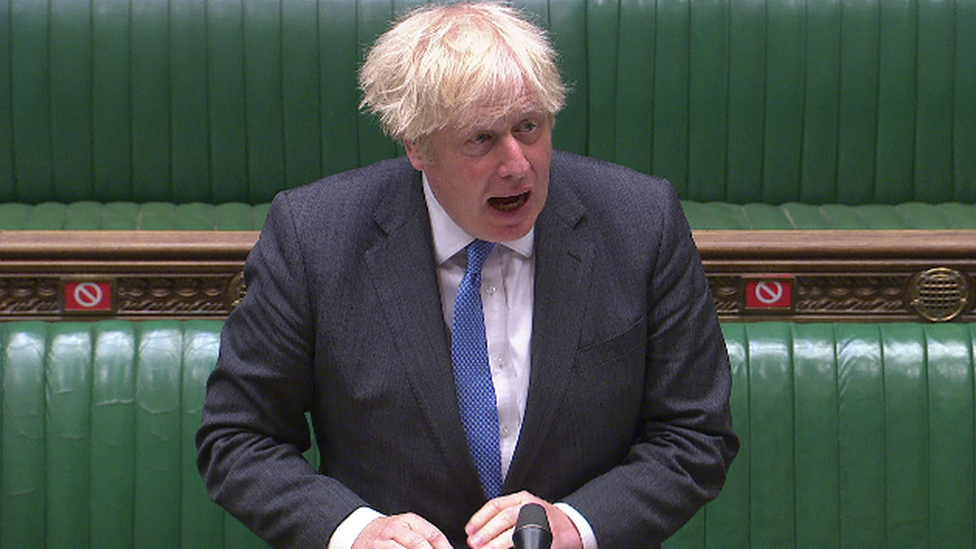
Boris Johnson says the people in Northern Ireland want a "stable, functioning and mature executive"
On Monday, Sinn Féin revealed it had asked Mr Lewis to introduce the laws at Westminster, saying it was the "only way forward to finally resolve" the dispute over Irish language legislation.
DUP MP Sammy Wilson said the government "must not interfere in devolved issues at the behest of Sinn Féin".
Party leader Edwin Poots has said he intends to support Irish language legislation but not necessarily before the next assembly election.
What is the language dispute about?
The stand-off between the two largest parties at Stormont over language and culture law potentially threatens the future of power-sharing.
It centres on the implementation of the New Decade, New Approach agreement, external, which was made in January 2020.
The deal includes an Office of Identity and Cultural Expression, an Irish language commissioner and a commissioner to enhance and develop the language and culture of the Ulster-Scots/Ulster-British tradition.
One of the key areas the parties disagreed on during the talks was over demands for a standalone Irish language act.
Sinn Féin wants the legislation passed before the end of the current NI Assembly term in May 2022, but the DUP has not given that commitment.


Could we be heading for a political first in Northern Ireland?
Solving a Stormont crisis with days to run before a deadline.
That is the hope of Brandon Lewis as he flies back to Northern Ireland to re-engage with Sinn Féin and the DUP.
But is he planning to put something on the table to break the deadlock?
Might he suggest - as per the demand from Sinn Féin - that Westminster will legislate for Irish language but only if the executive fails to act first?
But, crucially, without setting a deadline or timeline for that to happen?
If he does, will that be enough for Sinn Féin and the DUP to lift the threat hanging over the institutions?
Lots of questions but don't expect the answers as quickly as the secretary of state would like.

Earlier, the NI secretary said he wanted to get the Stormont executive "on a stable footing".
"We all want to see New Decade New Approach delivered and there is a cultural, cross-community package," Mr Lewis said.
"I want to make sure we do everything we can to ensure the first minister and deputy first minister can be nominated by the parties, which means they've got to find a way to agree a process."
In the House of Commons, Mr Lewis criticised the Republic of Ireland's Tánaiste (deputy prime minister) Leo Varadkar after he said he believed a united Ireland would happen in his lifetime.
Mr Lewis said Mr Varadkar's comments, made during an opening address of Fine Gael's Ard Fheis (party conference) on Tuesday, were "unhelpful and ill-advised" and urged people to "dial down the rhetoric".
Mr Varadkar said while the views of unionists must be "acknowledged and respected", "no one group can have a veto on Ireland's future".
Brandon Lewis responded to Leo Varadkar's comment that no group can veto Ireland's future
Conservative MP Simon Hoare, the chair of the NI Affairs Committee, said he would vote for an Irish language act if it came to the Commons.
Allow X content?
This article contains content provided by X. We ask for your permission before anything is loaded, as they may be using cookies and other technologies. You may want to read X’s cookie policy, external and privacy policy, external before accepting. To view this content choose ‘accept and continue’.

However, in a reply to his tweet, external, the DUP's Carla Lockhart said: "Not for the first time, a lack of real knowledge of Northern Ireland and a respect for devolution. You can't cherry pick when it suits you."
Meanwhile, assembly members have been told that the executive's post-pandemic recovery plan has been put on hold because of the absence of a first and deputy first minister.
The plan was due to be approved on Tuesday and set out by the interim head of the Civil Service, Jenny Pyper.
Ms Pyper said she hoped to give the plan from the Covid Taskforce on Thursday.
- Published15 June 2021
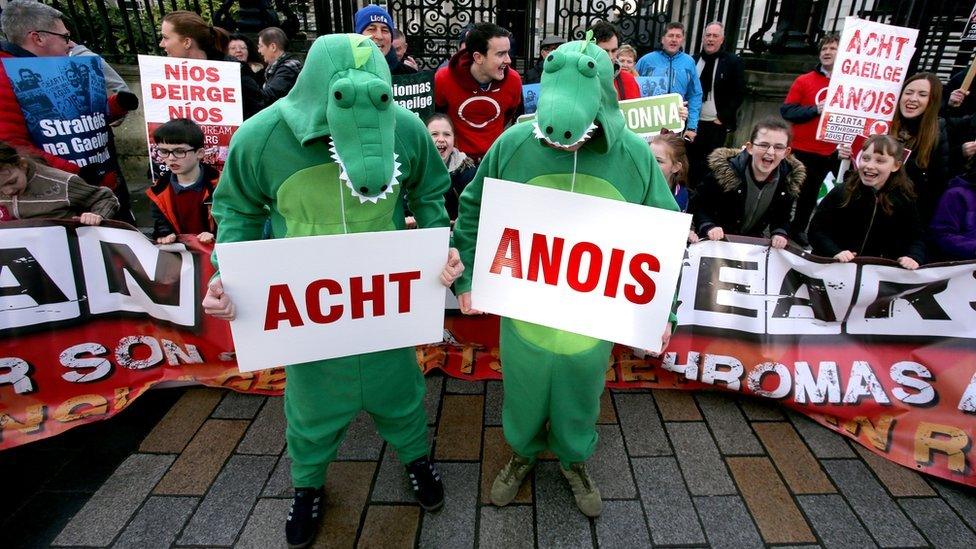
- Published14 June 2021
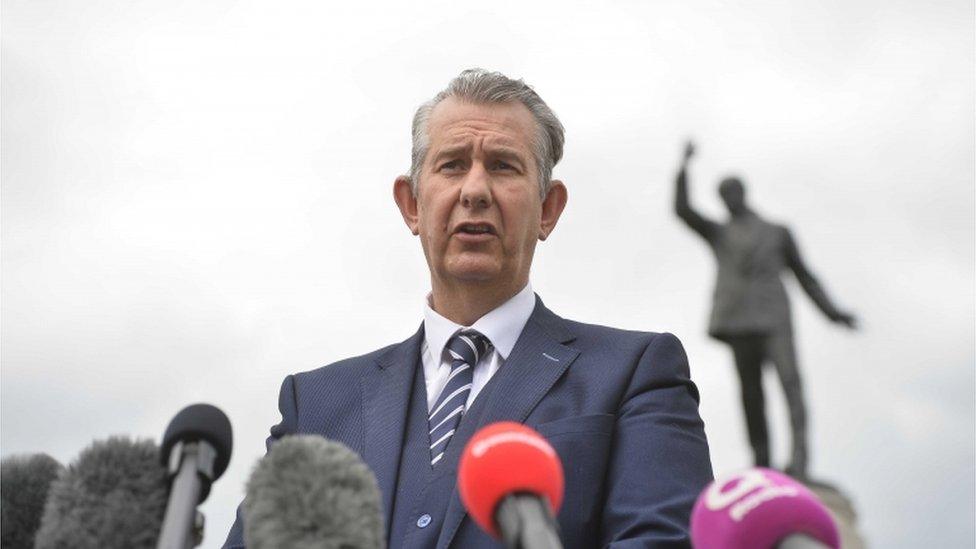
- Published13 June 2021
